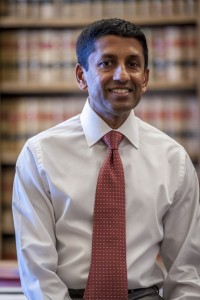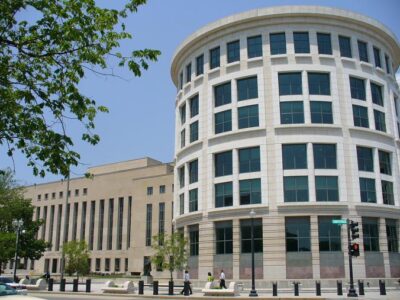Does Sri Srinivasan’s Clean Power Plan Role on the D.C. Circuit Panel Hurt His Nomination Chances?
He may feel compelled to recuse himself, lowering the odds that the CPP is upheld in the Court of Appeals
 Some environmentalists are already criticizing Sri Srinivasan’s environmental credentials because as a lawyer at O’Melveny & Meyers he defended Exxon Mobil and Rio Tinto, a mining company, in cases alleging human rights abuses in Indonesia and Papau New Guinea. He also represented Enron villain Jeff Skilling. But I wonder if Srinivasan’s nomination raises a different, more immediate liability: he is currently on the three-judge D.C. Circuit Court of Appeals panel slated to hear the state and coal industry challenge to the President’s Clean Power Plan. Why is that a liability? Because the Obama Administration may want to keep him on that panel and if he’s nominated to replace Justice Scalia on the Supreme Court, he may feel compelled to recuse himself from the panel. If the Obama Administration calculates that Srinivasan is unlikely to get Senate confirmation, advisors may decide that they’d rather have him on the Clean Power Plan panel than offer him up as the sacrificial nominee.
Some environmentalists are already criticizing Sri Srinivasan’s environmental credentials because as a lawyer at O’Melveny & Meyers he defended Exxon Mobil and Rio Tinto, a mining company, in cases alleging human rights abuses in Indonesia and Papau New Guinea. He also represented Enron villain Jeff Skilling. But I wonder if Srinivasan’s nomination raises a different, more immediate liability: he is currently on the three-judge D.C. Circuit Court of Appeals panel slated to hear the state and coal industry challenge to the President’s Clean Power Plan. Why is that a liability? Because the Obama Administration may want to keep him on that panel and if he’s nominated to replace Justice Scalia on the Supreme Court, he may feel compelled to recuse himself from the panel. If the Obama Administration calculates that Srinivasan is unlikely to get Senate confirmation, advisors may decide that they’d rather have him on the Clean Power Plan panel than offer him up as the sacrificial nominee.
Why would Srinivasan recuse himself? As I explained in an earlier post, under 28 U.S.C. Section 455, a judge “shall disqualify himself in any proceeding in which his impartiality might reasonably be questioned.” Srinivasan could feel that litigants in the CPP case before him could be concerned that he would alter his vote on the CPP case pending in the D.C. Circuit to influence Senators who might vote on his pending Supreme Court nomination — how he votes on the CPP as a D.C. Circuit Court judge could easily influence how a Senator would view his appointment to the Supreme Court. Even if Srinivasan is confident that he can be impartial, he may worry about the appearance of impropriety.
It’s no secret that the Environmental Protection Agency drew a panel of judges in the D.C. Circuit that is much more likely to defer to EPA’s exercise of its authority under the Clean Air Act to regulate power plants than some possible alternatives. In addition to Judge Srinivasan, the panel includes Judge Judith Rogers, a strong backer of EPA authority, and Karen Henderson, a George H. W. Bush appointee who is thought to be relatively moderate. EPA could have faced a much more conservative panel, as it did in defending its regulations to cut air pollution that crosses state lines. That panel included two Republican appointees hostile to expansive regulatory authority, who not only struck the regulations down but voted to stay the implementation of the rule pending the panel’s ruling on the merits of the case (the panel was subsequently overturned by the Supreme Court in EME Homer Generation v. EPA). The panel that is set to hear the Clean Power Plan challenge is not, of course, a sure bet to uphold the Clean Power Plan. No panel is. And Judge Henderson may be less likely to defer to EPA’s exercise of regulatory authority than the two Democratic appointees on the panel. If Srinivasan feels compelled to recuse himself, his replacement could be far more conservative, someone like Judge Brett Kavanaugh, who authored the court of appeals opinion striking down the cross state air pollution rule. If the odds of a Supreme Court nominee being confirmed by the Senate are extremely low, why take the risk and appoint Srinivasan and also risk altering the balance of power on the D.C. Circuit panel hearing the Clean Power Plan?








Reader Comments